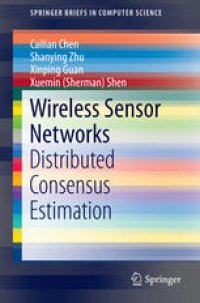
Ebook: Wireless Sensor Networks: Distributed Consensus Estimation
- Tags: Information Systems Applications (incl. Internet), Computer Communication Networks
- Series: SpringerBriefs in Computer Science
- Year: 2014
- Publisher: Springer International Publishing
- Edition: 1
- Language: English
- pdf
This SpringerBrief evaluates the cooperative effort of sensor nodes to accomplish high-level tasks with sensing, data processing and communication. The metrics of network-wide convergence, unbiasedness, consistency and optimality are discussed through network topology, distributed estimation algorithms and consensus strategy. Systematic analysis reveals that proper deployment of sensor nodes and a small number of low-cost relays (without sensing function) can speed up the information fusion and thus improve the estimation capability of wireless sensor networks (WSNs). This brief also investigates the spatial distribution of sensor nodes and basic scalable estimation algorithms, the consensus-based estimation capability for a class of relay assisted sensor networks with asymmetric communication topology, and the problem of filter design for mobile target tracking over WSNs. From the system perspective, the network topology is closely related to the capability and efficiency of network-wide scalable distributed estimation. Wireless Sensor Networks: Distributed Consensus Estimation is a valuable resource for researchers and professionals working in wireless communications, networks and distributed computing. Advanced-level students studying computer science and electrical engineering will also find the content helpful.
This SpringerBrief evaluates the cooperative effort of sensor nodes to accomplish high-level tasks with sensing, data processing and communication. The metrics of network-wide convergence, unbiasedness, consistency and optimality are discussed through network topology, distributed estimation algorithms and consensus strategy. Systematic analysis reveals that proper deployment of sensor nodes and a small number of low-cost relays (without sensing function) can speed up the information fusion and thus improve the estimation capability of wireless sensor networks (WSNs). This brief also investigates the spatial distribution of sensor nodes and basic scalable estimation algorithms, the consensus-based estimation capability for a class of relay assisted sensor networks with asymmetric communication topology, and the problem of filter design for mobile target tracking over WSNs. From the system perspective, the network topology is closely related to the capability and efficiency of network-wide scalable distributed estimation. Wireless Sensor Networks: Distributed Consensus Estimation is a valuable resource for researchers and professionals working in wireless communications, networks and distributed computing. Advanced-level students studying computer science and electrical engineering will also find the content helpful.